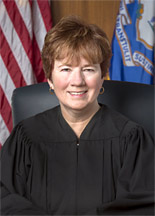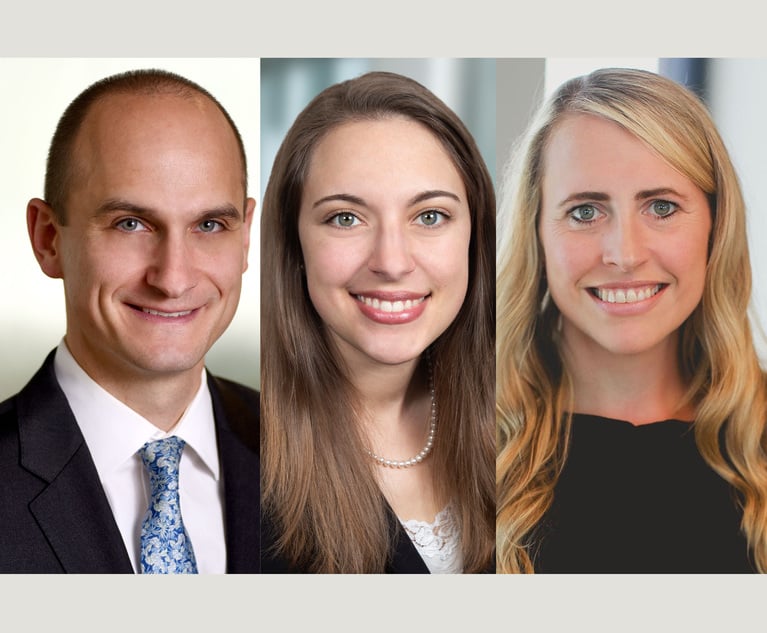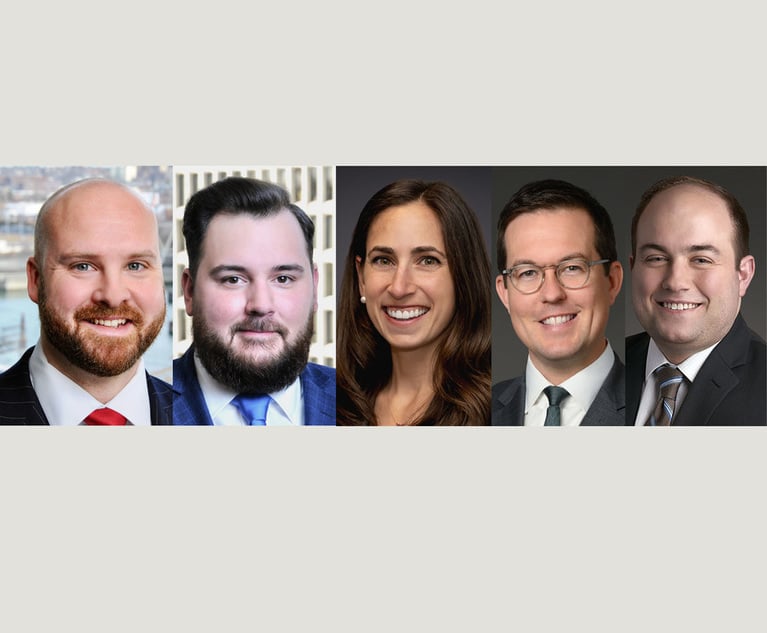Lamont Makes Interim Supreme, Appellate Court Appointments
The governor chose Hartford Appellate Court Judge Christine E. Keller to serve on the Connecticut Supreme Court and made three Appellate Court appointments.
July 20, 2020 at 03:07 PM
6 minute read
 Connecticut Supreme Court building in Hartford, CT. June 3, 2020. Photo by Michael Marciano.
Connecticut Supreme Court building in Hartford, CT. June 3, 2020. Photo by Michael Marciano.
Gov. Ned Lamont announced the appointment of a new Connecticut Supreme Court justice Monday afternoon, along with three Appellate Court nominations.
The governor chose Hartford Appellate Court Judge Christine E. Keller to serve on the Connecticut Supreme Court, replacing Justice Richard Palmer, who reached the mandatory age of retirement in May. Lamont selected Superior Court Judge Jose A. Suarez to fill the vacancy left by Keller, and picked two other Superior Court judges to fill Appellate vacancies: Judges Joan Alexander and Melanie Cradle were chosen to take over for retiring Chief Appellate Judge Alexandra DiPentima and fellow retiring Judge Robert Devlin.
With the state's General Assembly out of regular session, the interim appointments are subject to approval by the Judiciary Committee within 45 days.
"Nominating people to serve on our courts is one of the most important responsibilities of a governor," Lamont said in a written release. "These jurists have an enormous impact on our communities, and the individuals who serve in these roles must display a strong commitment to fairness and justice."
Lamont called the nominees "some of the best and brightest legal minds in Connecticut." Additional information on each appointee follows:
Judge Christine E. Keller
Judge Keller, 67, is a resident of Hartford who has served on the Appellate Court since 2013. Prior to that, she served on the Superior Court beginning in 1993 and was a family support magistrate beginning in 1989.
 Judge Christine E. Keller
Judge Christine E. KellerWhile on the Superior Court, Keller served as presiding judge in both the Hartford and Plainville juvenile courts. She also served terms in Waterbury criminal court, New Britain civil and family courts, the Middletown Regional Child Protection Session and Hartford criminal and civil courts. From 1997 to 2002, she served as the statewide chief administrative judge for juvenile matters.
Judge Keller has served on a number of task forces and committees affecting juvenile issues, including the Juvenile Justice Advisory Committee and the Child Advocate Advisory Board. She has also served on the Court Improvement Project Advisory Board and the Governor's Task Force on Judicial Reform, which addressed openness in the judicial branch. She was chairperson of the Committee on Judicial Ethics, and from 1997 to 2005 was a member of the Superior Court Rules Committee. She also served as chair of a task force to recommend revisions to the juvenile rules of practice and a member of a subcommittee proposing revisions to the Code of Judicial Conduct.
Prior to her appointment as a family support magistrate and after graduation from law school, Keller practiced family, personal injury and real estate law at Neighborhood Legal Services in Hartford. She also worked at the Office of the Corporation Counsel for the City of Hartford and at the law firm of Ritter and Keller.
Keller earned her bachelor's degree from Smith College in 1974, and her juris doctor from UConn Law School in 1977.
Judge Joan Alexander
Judge Alexander, 58, of Cromwell has served on the Superior Court since 2000. She is the chief administrative judge for the criminal division and is assigned as the administrative and presiding judge for criminal matters in the Fairfield Judicial District. She is also currently the chair of the Sentence Review Division and co-chair of the Judicial-Media Committee. She was previously the administrative judge in the New Britain Judicial District and has served as the presiding criminal judge in New Britain, Hartford, Waterbury, Litchfield and New Haven.
Before joining the bench, Alexander was a prosecutor with the Connecticut Division of Criminal Justice. She was assigned to the Waterbury and Hartford State's Attorneys offices and then became supervisor of the Statewide Prosecution Bureau. During her time as prosecutor, she handled many homicide and arson cases.
Alexander earned her bachelor's degree from Yale University in 1984 and her JD from UConn Law School in 1987.
Judge Melanie Cradle
Judge Cradle, 49, of Durham, Connecticut, has served on the Superior Court since 2013, and will be the first African-American woman to serve on the Appellate Court.
Cradle heard criminal cases in Bridgeport for a year before moving to the New Haven Judicial District in 2014. In 2015, she became the presiding judge in GA 23 in New Haven. She also serves on the Law Library Advisory Committee, the Rules Committee of the Superior Court, and the Criminal Justice Commission. She is a member of the New Haven Inn of Court, is a James W. Cooper Fellow with the Connecticut Bar Foundation and is an adjunct professor at Quinnipiac University School of Law.
Before her appointment to the bench, Cradle was senior assistant state's attorney for the Ansonia/Milford Judicial District. She also served as assistant state's attorney in New Haven and an adjunct professor at Housatonic Community College.
Cradle has served as a member of the National College of District Attorneys, the National Association of Black Prosecutors, the Ansonia/Milford Multidisciplinary Team and the State of Connecticut Division of Criminal Justice Diversity Committee. She was also a mentor for the Lawyers Collaborative for Diversity.
Cradle earned her bachelor's degree from Adelphi University in 1993, and her juris doctor from Seton Hall University School of Law in 1998.
Judge Jose A. Suarez
Judge Suarez, 54, is a resident of Chester, Connecticut and has served on the Superior Court since 2009. He has been the administrative judge for the Middlesex Judicial District since 2017. During his first three years on the bench, Suarez served in the Tolland Judicial District, where he heard criminal and family matters.
From 2012 to 2015, he was assigned to the Hartford Judicial District and presided over criminal jury trials. From 2015 to 2017, he was the presiding judge for the Hartford Judicial District Family Division. As a Superior Court judge, Suarez has authored more than 90 opinions and has presided over 50 jury trials.
Before joining the bench, Suarez worked in the Connecticut Office of the Attorney General, including in the office's Child Protection Unit, where he handled complex child protection matters. In 2003, he transferred to the office's Environment Department, handling state and national climate change matters.
Suarez was born in Puerto Rico and moved to Connecticut with his family at the age of 11. He earned his bachelor's degree from University of Dayton in 1989, and his juris doctor from UConn School of Law in 1993.
This content has been archived. It is available through our partners, LexisNexis® and Bloomberg Law.
To view this content, please continue to their sites.
Not a Lexis Subscriber?
Subscribe Now
Not a Bloomberg Law Subscriber?
Subscribe Now
NOT FOR REPRINT
© 2025 ALM Global, LLC, All Rights Reserved. Request academic re-use from www.copyright.com. All other uses, submit a request to [email protected]. For more information visit Asset & Logo Licensing.
You Might Like
View All

Apple Disputes 'Efforts to Manufacture' Imaging Sensor Claims Against iPhone 15 Technology

New Partners at Cummings & Lockwood, Carmody Torrance Sandak & Hennessey
2 minute read
Trending Stories
- 1$5 Million Settlement Reached With Stone Academy
- 2$15K Family Vacation Turned 'Colossal Nightmare': Lawsuit Filed Against Vail Ski Resorts
- 3Prepare Your Entries! The California Legal Awards Have a New, February Deadline
- 4DOJ Files Antitrust Suit to Block Amex GBT's Acquisition of Competitor
- 5K&L Gates Sheds Space, but Will Stay in Flagship Pittsburgh Office After Lease Renewal
Who Got The Work
Michael G. Bongiorno, Andrew Scott Dulberg and Elizabeth E. Driscoll from Wilmer Cutler Pickering Hale and Dorr have stepped in to represent Symbotic Inc., an A.I.-enabled technology platform that focuses on increasing supply chain efficiency, and other defendants in a pending shareholder derivative lawsuit. The case, filed Oct. 2 in Massachusetts District Court by the Brown Law Firm on behalf of Stephen Austen, accuses certain officers and directors of misleading investors in regard to Symbotic's potential for margin growth by failing to disclose that the company was not equipped to timely deploy its systems or manage expenses through project delays. The case, assigned to U.S. District Judge Nathaniel M. Gorton, is 1:24-cv-12522, Austen v. Cohen et al.
Who Got The Work
Edmund Polubinski and Marie Killmond of Davis Polk & Wardwell have entered appearances for data platform software development company MongoDB and other defendants in a pending shareholder derivative lawsuit. The action, filed Oct. 7 in New York Southern District Court by the Brown Law Firm, accuses the company's directors and/or officers of falsely expressing confidence in the company’s restructuring of its sales incentive plan and downplaying the severity of decreases in its upfront commitments. The case is 1:24-cv-07594, Roy v. Ittycheria et al.
Who Got The Work
Amy O. Bruchs and Kurt F. Ellison of Michael Best & Friedrich have entered appearances for Epic Systems Corp. in a pending employment discrimination lawsuit. The suit was filed Sept. 7 in Wisconsin Western District Court by Levine Eisberner LLC and Siri & Glimstad on behalf of a project manager who claims that he was wrongfully terminated after applying for a religious exemption to the defendant's COVID-19 vaccine mandate. The case, assigned to U.S. Magistrate Judge Anita Marie Boor, is 3:24-cv-00630, Secker, Nathan v. Epic Systems Corporation.
Who Got The Work
David X. Sullivan, Thomas J. Finn and Gregory A. Hall from McCarter & English have entered appearances for Sunrun Installation Services in a pending civil rights lawsuit. The complaint was filed Sept. 4 in Connecticut District Court by attorney Robert M. Berke on behalf of former employee George Edward Steins, who was arrested and charged with employing an unregistered home improvement salesperson. The complaint alleges that had Sunrun informed the Connecticut Department of Consumer Protection that the plaintiff's employment had ended in 2017 and that he no longer held Sunrun's home improvement contractor license, he would not have been hit with charges, which were dismissed in May 2024. The case, assigned to U.S. District Judge Jeffrey A. Meyer, is 3:24-cv-01423, Steins v. Sunrun, Inc. et al.
Who Got The Work
Greenberg Traurig shareholder Joshua L. Raskin has entered an appearance for boohoo.com UK Ltd. in a pending patent infringement lawsuit. The suit, filed Sept. 3 in Texas Eastern District Court by Rozier Hardt McDonough on behalf of Alto Dynamics, asserts five patents related to an online shopping platform. The case, assigned to U.S. District Judge Rodney Gilstrap, is 2:24-cv-00719, Alto Dynamics, LLC v. boohoo.com UK Limited.
Featured Firms
Law Offices of Gary Martin Hays & Associates, P.C.
(470) 294-1674
Law Offices of Mark E. Salomone
(857) 444-6468
Smith & Hassler
(713) 739-1250










